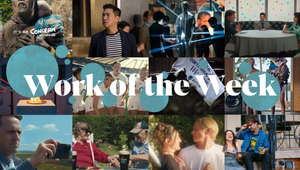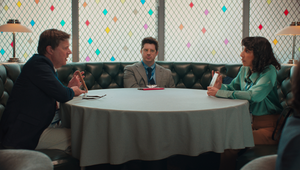
Why Jungle Studios is Allocating Its Entire Entertainment Budget to New Mentorship Scheme

The past year has shaken us all in many ways, bringing several ongoing issues to the forefront and setting the wheels of change in motion. Experiencing a global pandemic has shone a spotlight on some of the most obvious inequalities across society, with the unfairly disadvantaged taking the biggest hits. With the world turned on its head and forced to start again, this period has called out for us all to do things better this time around.
For the team at sound company Jungle Studios, a combination of these factors teamed with the industry at a halt, drove the staff to come together and implement change. With cancelled awards seasons and productions on hiatus, a new opportunity arose to allocate budgets and time in a way that could support the betterment of the sound industry. As a largely “invisible” career path, it has long been the norm to hire new talent from within close networks, leading to a less diverse pool of people to draw from.
In an effort to change this narrative, Jungle Studios has spearheaded a new 12 month mentorship scheme which will see the team collaborating with schools and colleges to raise awareness of careers within sound, and closely mentoring a diverse range of students with the aim of helping them obtain jobs within the industry.
In this interview, Jungle’s managing director Graham Ebbs, creative director Ben Leeves, director Allan Johnston, sound engineer Stuart Allen-Hynd and sound designer Sean Mahoney to discuss their exciting new programme and how they aim to improve diversity in the industry.
LBB> Jungle has been known for having a robust and welcoming runners programme, why was it important to you all to spearhead a new kind of mentorship scheme at Jungle?
Graham Ebbs> For a very long time, this industry has been made up of people who got in because they knew somebody, or knew somebody who knew somebody. It’s been slowly getting better over the last 10 years or so but I think it's fairly safe to say that there's very very few people in this industry that have got into it without having had that. I’m one of them.
And the other issue is that not a lot of people know about this industry to start with - I certainly didn't. A lot of people fell into the job because they were doing music and stumbled across sound design.
The pandemic has really highlighted the difference between those who have got money and those who haven’t. For those who could afford a computer to work from home it was less of a problem than for those who had to physically attend their jobs to get paid. So I think if there was ever a year to push people into action and redress the imbalance, this is it.
And in terms of awards, they’re nice but they're generally an opportunity for people to get together. But we can’t even do that this year. So that was another factor that helped us make the decision to allocate our budget into a better cause.
Stuart Allen-Hynd> We wanted to find ways to support talented young people from varying socio-economic and multi-cultural backgrounds to help them gain access and awareness of careers within the advertising industry.
Through partaking in the Creative Mentorship Program, we discovered how much of a great opportunity it is for finding future talent. It doesn’t take much to run a few workshops, host a few events and mentor some students. And in return, a group of young people are hopefully inspired and exposed to a career they might not have known existed or thought was accessible to them.
LBB> How do you hope to see this positively impact the people that take part?
Stuart> I hope it gives young people more of a choice and awareness of careers they might not have known. This will benefit the industry and the world as a whole. Personally I come away feeling really inspired by the talent and I feel rewarded when someone takes a step towards their career.
Graham> It's very easy to say we're going to offer opportunities to people and we're going to be more inclusive and then just give somebody a week's work experience but that doesn't really do anybody any good. Because that's not building the networks and building the connections that they need in order to be able to get a job. What we're trying to do is nurture young talent to discover those people who are actually going to go on and do great things in the industry and give them the opportunity and training to do so. Once they've gone through this process, they will actually be able to demonstrate that they've got some real skills. And I think with our reputation coupled with our people, who do have a track record in training people, will offer real value.
It’s a 12 month programme. It starts with going into the schools in January, so that we can provide the insight that this whole industry exists. From that, we will then identify the GCSE students who find the industry quite interesting, and we’ll whittle down those who show real potential. They’ll then go into the structured programme where we will mentor them with the aim to get them a job in the industry. The whole programme has some real substance to it rather than just paying lip service.
Allan Johnston> The students will inevitably gain technical knowledge, but there's everything else that goes with it, such as how to conduct yourself at work, how to interact with management, and how to create a CV. These are all byproducts of them actually spending quality time here, rather than just coming in for one week's work.
Graham> Our staff are so enthusiastic about this simply because they recognise that we're all so lucky to have the jobs we've got, and that they also recognise that it's not always the best thing to just give the job to a friend of a friend, because you want the best people.
LBB> How have recent events impacted young people and their access to training / learning in the sound industry?
Sean Mahoney> I think young people have been hit really hard with recent events. Before lockdown we would constantly have young people in for work experience. It's a great way for them to see first-hand how a post production studio works. It's also a good way for us to come across young talent as a lot of our recruiting is done this way.
Ben Leeves> It’s had a huge impact. The first route into a sound studio is usually through runners who look after the clients within the building. Sadly, we don't have as many clients in the building so there's been less need for runners. It’s been the case in a lot of industries where the most junior role has been reduced or taken away. It’s a big blow for getting young kids into creative industries - which are difficult enough to get into in the first place let alone when you take away the first few steps.
LBB> How can this new initiative support diversity and inclusivity? How can the industry as a whole encourage more talent to enter?
Sean> I think it’s important to reach out to young people who wouldn’t necessarily know about the job we do. A lot of the time in our industry it’s all about who you know, I think it’s about helping those young people who are passionate and talented who don’t have access to the contacts to get their foot in the door.
Ben> Getting more people from different cultures and areas to hear what’s involved in this business is the most important thing - making sure we reach a broader range of people. There is no reason at all that anybody should be deterred from trying to work in the creative industry. There are lots of barriers to lots of things in life but we don’t want the creative industry to be one.
Stuart> The industry is dominated by white middle class people, and we all know that a lot of people in the industry have secured jobs because they know someone, or they know someone who knows someone. This means that the industry doesn’t attract a diversity of talent or culture. If you are only employing people from within your circle, this is a problem and you are limiting yourself - creatively, socially and economically. Remedying this will benefit not only the business itself, but also everyone involved, making the industry and the world more fair, rich and creative.
LBB> How does this business investment align with your overall goals and values?
Allan> I think what has been really interesting is that the driving force of this movement has very much been the staff. It's really very much been a collective desire of all the team to start supporting people who haven’t necessarily had the opportunity that we have had.
So one of Jungle’s greatest values is that the staff feel empowered to approach management with how they want to see the company develop. It's the openness of the company that really allows these opportunities to happen.
Graham> I think the other thing is that we've always provided opportunities based on merit. The people who have grown at Jungle have been those who started work here in the running department and have worked their way up. Giving people those opportunities purely on merit rather than on who they know and who their connections are helps build the right culture for growth.
LBB> What did your training process involve?
Sean> Learning a variety of skills on how best to help our mentees with getting into the creative industries. This includes helping them prepare for interviews, introducing them to our contacts and helping them set achievable goals.
Stuart> Due to lockdown, my training included attending a number of Zoom workshops hosted by the Creative Mentorship Network. It was aimed at linking mentors and mentees within the advertising industry. The workshops consisted of various exercises including a mentor development programme, understanding the concept of social and cultural capital, and how this impacts on diversity and inclusion. We learnt how best to communicate with our mentees - listening being a key skill in this.
Because of how the mentorship programme was set up, it meant we could call on other mentors if support was needed, which was great if you didn’t have the connections within the industry to link your mentee in with. Also Creative Mentorship Network provided a great support network if you ever needed external help or advice during the programme.
LBB> Do you feel that enough kids are aware of opportunities in audio engineering from a young age?
Stuart> No definitely not. A lot of students hear of music production or composition as a possible career path, but not so much sound design or audio post production. For me, this is not just about audio engineering but about exposing a creative world that otherwise would have not been known about, whether that be film editing, directing, sound design, and opening up these opportunities and doors for those that are keen and willing to learn.
Sean> I don't think a lot of young people know a job like mine exists, I certainly didn't when I was growing up. I have found it has been really useful explaining to my mentee the variety of jobs out there in our industry and how their skills are applicable.
Graham> There is a real need to build some more industry awareness - lots of teenagers have no idea that these jobs even exist. Nurturing these interests from a young age and giving them that framework to explore this avenue would put the future of our industry in great hands.
Allan> The technology that creates and records sound exists within kids’ lives but the problem is, they’ve only got one perspective of which direction you can take that, which is music. And that is a really difficult industry to get into. In sound, we can show them the vast range of opportunities that can allow them to continue with their interest in music but also to be able to make a living.
LBB> Did you ever get an opportunity like this when you were starting out in the industry?
Sean> I didn't have an opportunity like this when I was younger and would have loved it. I think being someone who is more creative and less academic, it was hard for me to understand what sort of careers and jobs there were out there for someone like me.
Ben> When I got involved in this mentorship programme, it really rammed home for me how unaware people are of this industry. I certainly hadn’t heard about it when I was younger. I had no idea this industry existed, to the point where I never looked at a film or a TV commercial and took note that there was the skill of audio behind it. I just saw sound and picture together as one. I didn't know a whole world existed that just worked on the sound. I thought the two came together as a package and that was it. It’s crazy because both my uncles were in advertising already but I'd never spoken to them about it. It’s so important that we’re taught in schools about these opportunities that exist.















